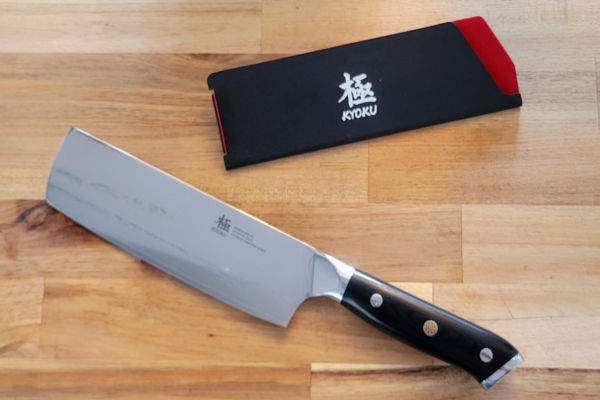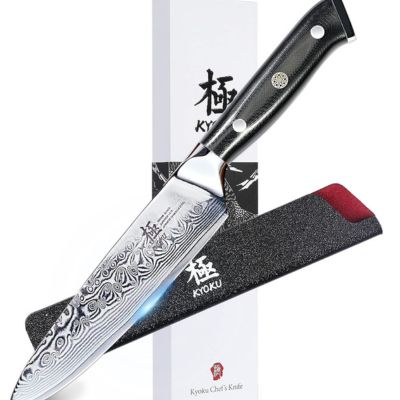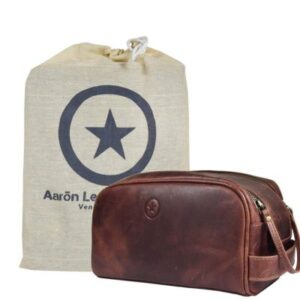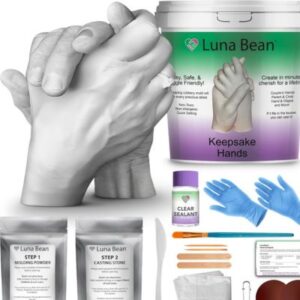The KYOKU 6″ Utility Knife from the Shogun Series is a high-quality, versatile kitchen tool crafted for chefs and home cooks alike. Made with VG10 Japanese steel at an HRC 58-60 hardness, this knife is designed for precision cutting and long-lasting sharpness. Priced at $49.89 with an option for 10% off through a coupon, it is a great deal for anyone looking to elevate their kitchen gear.
Key Features
- VG-10 Japanese Steel Core: The blade features a VG-10 Damascus steel core that is enhanced with cobalt for improved durability, sharper edges, and easier sharpening. This makes it a reliable choice for precision cuts.
- Ergonomic G10 Handle: The handle is constructed from G10 material, known for its heat, moisture, and cold resistance, ensuring durability and comfort. The handle design also includes a mosaic pin for added strength and an engraved rivet for aesthetic appeal.
- Superior Sharpness: The knife is sharpened using the traditional 3-step Honbazuke method, achieving an 8-12° double edge that gives it an incredibly sharp edge ideal for slicing, dicing, and chopping.
- Herringbone Pattern: The hammer-beaten herringbone pattern at the base of the tang helps prevent food from sticking to the blade, improving efficiency during use.
- Protective Sheath & Case: The knife comes with a sheath and case for easy storage and protection, ensuring that the blade remains sharp and the knife is kept safe when not in use.

Pros
- High-Performance Blade: The VG-10 core provides excellent edge retention and cutting power, allowing for smooth, precise cuts.
- Ergonomic & Durable Handle: The G10 handle offers a comfortable, secure grip while being resistant to wear, making the knife easy to handle for extended use.
- Versatility: At 6 inches, this utility knife is perfect for everyday tasks like chopping vegetables, slicing meats, or mincing herbs.
- Attractive Design: The beautiful Damascus pattern on the blade and engraved details on the handle make this knife visually stunning as well as functional.
- Protection Included: The sheath and case add value, keeping the knife safe during storage or transport.
Cons
- Relatively Expensive: While the knife is competitively priced for its quality, it might be a bit more expensive compared to basic utility knives.
- Blade Care: As a high-quality Damascus steel knife, it requires proper care and maintenance to preserve its sharpness and prevent rust.
Customer Feedback
With a 4.7 out of 5 stars rating from over 4,300 reviewers, customers rave about the superior sharpness, comfortable handle, and the quality craftsmanship of the knife. Many mention that it holds its edge well and performs exceptionally in various kitchen tasks. However, some users recommend careful handling due to the sharpness and the need for maintenance to keep it in top condition.
Verdict
The KYOKU Shogun Series 6″ Utility Knife offers an exceptional combination of performance, design, and value. With its VG-10 steel core, ergonomic handle, and superior sharpness, it is an excellent choice for both professional chefs and home cooks who want a versatile, high-quality knife for everyday use. The included sheath and case add an extra layer of convenience and protection, making it a solid investment for any kitchen.
Rating: ⭐⭐⭐⭐⭐ (4.7/5)
Would Recommend: Yes, especially for those seeking a well-balanced, durable, and sharp utility knife.
FAQ for “Japanese Pocket Knife”
1. What is a Japanese pocket knife?
A Japanese pocket knife is a small, portable cutting tool with a folding blade, traditionally crafted in Japan. These knives are known for their precision, craftsmanship, and unique design, often used for daily tasks, outdoor activities, or as collectibles. Some well-known types include the Higonokami, Yanagiba, and Kogatana.
2. What makes Japanese pocket knives different from others?
Japanese pocket knives are renowned for their high-quality craftsmanship, sharpness, and the use of premium materials such as high-carbon steel or Damascus steel. The blades are often thinner and sharper than those of many Western knives, and the folding mechanisms are smooth and precise.
3. Are Japanese pocket knives good for everyday carry (EDC)?
Yes, many Japanese pocket knives are well-suited for EDC. They are lightweight, compact, and designed for ease of use. Whether you need a knife for opening packages, cutting rope, or food prep, a Japanese pocket knife is a reliable choice.
4. What types of Japanese pocket knives are there?
Some popular types include:
- Higonokami: A traditional Japanese folding knife with a simple, slip-joint mechanism.
- Yanagiba: A long, thin knife commonly used in sushi preparation, but available in pocket knife form.
- Kogatana: A small utility knife often used for carving and detailed tasks.
- Japanese folding knives (like the “Aogami” or “Blue Steel” knives): Known for their sharpness and durability.
5. How should I maintain a Japanese pocket knife?
To keep your Japanese pocket knife in top condition:
- Clean the blade regularly with a soft cloth and warm water. Dry it completely to avoid rusting.
- Oil the blade periodically with a light machine oil or mineral oil to prevent corrosion, especially on high-carbon steel blades.
- Sharpen the knife using a whetstone or professional sharpening service to maintain the edge.
- Store the knife in a dry place, preferably in a sheath or protective case to avoid damage.
6. Why are Japanese pocket knives so expensive?
Japanese pocket knives can be more expensive due to the high-quality materials used (such as high-carbon steel or Damascus steel), the time-consuming and meticulous craftsmanship, and the cultural value of Japanese knives. Many of these knives are handmade by skilled artisans, contributing to their higher price.
7. Can a Japanese pocket knife be used for outdoor activities?
Yes, many Japanese pocket knives are suitable for outdoor tasks such as camping, fishing, and hunting. However, be mindful that traditional Japanese knives like the Yanagiba are more specialized for culinary tasks. If you’re looking for an outdoor-specific Japanese knife, look for one designed for utility, such as a Higonokami or Shirasaya-style knife.
8. What is the difference between a Japanese folding knife and a Western pocket knife?
Japanese folding knives often feature:
- Thinner blades for greater precision and sharpness.
- Simple mechanisms, such as a slip-joint or friction lock, which are different from Western locking mechanisms.
- High-carbon or Damascus steel, often providing a sharper, more durable edge. Western knives, on the other hand, tend to be more robust, with thicker blades and more complex locking mechanisms.
9. Can I use a Japanese pocket knife for food preparation?
Yes, many Japanese pocket knives, such as the Yanagiba and Deba, are designed specifically for culinary tasks, especially in Japanese cuisine. These knives are perfect for slicing, filleting, and other precise cutting tasks.
10. Are Japanese pocket knives legal to carry?
The legality of carrying a Japanese pocket knife depends on local laws and regulations. In some areas, carrying a folding knife is allowed, but carrying a fixed blade may have restrictions. Always check your local laws regarding blade length and carrying knives.





Reviews
There are no reviews yet.